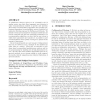Free Online Productivity Tools
i2Speak
i2Symbol
i2OCR
iTex2Img
iWeb2Print
iWeb2Shot
i2Type
iPdf2Split
iPdf2Merge
i2Bopomofo
i2Arabic
i2Style
i2Image
i2PDF
iLatex2Rtf
Sci2ools
136
Voted
STOC
2004
ACM
2004
ACM
Using mixture models for collaborative filtering
A collaborative filtering system at an e-commerce site or similar service uses data about aggregate user behavior to make recommendations tailored to specific user interests. We develop recommendation algorithms with provable performance guarantees in a probabilistic mixture model for collaborative filtering proposed by Hoffman and Puzicha. We identify certain novel parameters of mixture models that are closely connected with the best achievable performance of a recommendation algorithm; we show that for any system in which these parameters are bounded, it is possible to give recommendations whose quality converges to optimal as the amount of data grows. All our bounds depend on a new measure of independence that can be viewed as an L1-analogue of the smallest singular value of a matrix. Using this, we introduce a technique based on generalized pseudoinverse matrices and linear programming for handling sets of high-dimensional vectors. We also show that standard approaches based on L2...
Algorithms | Collaborative Filtering | Keywords Mixture Models | Probabilistic Mixture Model | STOC 2004 |
Related Content
| Added | 03 Dec 2009 |
| Updated | 03 Dec 2009 |
| Type | Conference |
| Year | 2004 |
| Where | STOC |
| Authors | Jon M. Kleinberg, Mark Sandler |
Comments (0)

